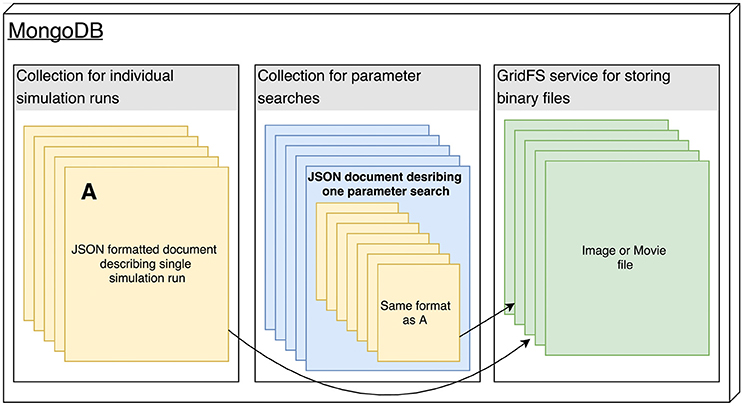Difference between revisions of "Template:Article of the week"
Shawndouglas (talk | contribs) (Updated article of the week text.) |
Shawndouglas (talk | contribs) (Updated article of the week text.) |
||
| Line 1: | Line 1: | ||
<div style="float: left; margin: 0.5em 0.9em 0.4em 0em;">[[File: | <div style="float: left; margin: 0.5em 0.9em 0.4em 0em;">[[File:Fig2 Antolik FrontInNeuro2018 12.jpg|240px]]</div> | ||
'''"[[Journal: | '''"[[Journal:Arkheia: Data management and communication for open computational neuroscience|Arkheia: Data management and communication for open computational neuroscience]]"''' | ||
Two trends have been unfolding in [[Neuroinformatics|computational neuroscience]] during the last decade. First, focus has shifted to increasingly complex and heterogeneous neural network models, with a concomitant increase in the level of collaboration within the field (whether direct or in the form of building on top of existing tools and results). Second, general trends in science have shifted toward more open communication, both internally, with other potential scientific collaborators, and externally, with the wider public. This multi-faceted development toward more integrative approaches and more intense communication within and outside of the field poses major new challenges for modelers, as currently there is a severe lack of tools to help with automatic communication and sharing of all aspects of a simulation workflow to the rest of the community. To address this important gap in the current computational modeling software infrastructure, here we introduce Arkheia, a web-based open science platform for computational models in systems neuroscience. It provides an automatic, interactive, graphical presentation of simulation results, experimental protocols, and interactive exploration of parameter searches in a browser-based application. ('''[[Journal:Arkheia: Data management and communication for open computational neuroscience|Full article...]]''')<br /> | |||
<br /> | <br /> | ||
''Recently featured'': | ''Recently featured'': | ||
: ▪ [[Journal:Developing a bioinformatics program and supporting infrastructure in a biomedical library|Developing a bioinformatics program and supporting infrastructure in a biomedical library]] | |||
: ▪ [[Journal:Big data and public health systems: Issues and opportunities|Big data and public health systems: Issues and opportunities]] | : ▪ [[Journal:Big data and public health systems: Issues and opportunities|Big data and public health systems: Issues and opportunities]] | ||
: ▪ [[Journal:Generating big data sets from knowledge-based decision support systems to pursue value-based healthcare|Generating big data sets from knowledge-based decision support systems to pursue value-based healthcare]] | : ▪ [[Journal:Generating big data sets from knowledge-based decision support systems to pursue value-based healthcare|Generating big data sets from knowledge-based decision support systems to pursue value-based healthcare]] | ||
Revision as of 15:36, 21 May 2018
"Arkheia: Data management and communication for open computational neuroscience"
Two trends have been unfolding in computational neuroscience during the last decade. First, focus has shifted to increasingly complex and heterogeneous neural network models, with a concomitant increase in the level of collaboration within the field (whether direct or in the form of building on top of existing tools and results). Second, general trends in science have shifted toward more open communication, both internally, with other potential scientific collaborators, and externally, with the wider public. This multi-faceted development toward more integrative approaches and more intense communication within and outside of the field poses major new challenges for modelers, as currently there is a severe lack of tools to help with automatic communication and sharing of all aspects of a simulation workflow to the rest of the community. To address this important gap in the current computational modeling software infrastructure, here we introduce Arkheia, a web-based open science platform for computational models in systems neuroscience. It provides an automatic, interactive, graphical presentation of simulation results, experimental protocols, and interactive exploration of parameter searches in a browser-based application. (Full article...)
Recently featured:










